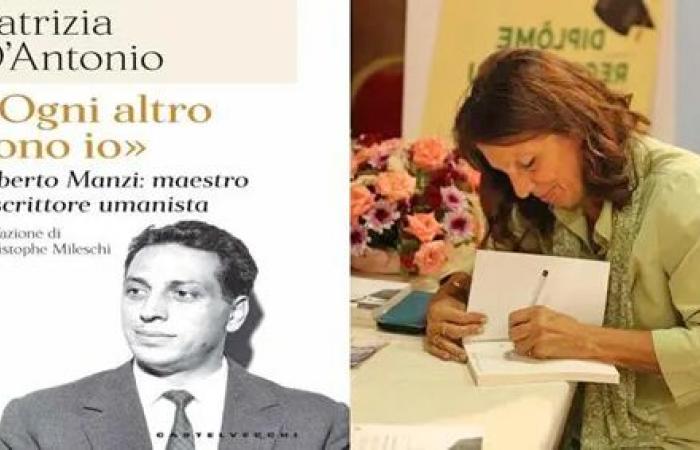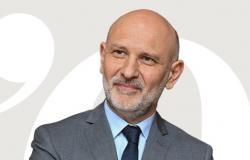
LIBE: You presented your book Ogni Altro sono io on the occasion of Italian Language Week. Before talking about it, what do you think the Italian language represents today?
Patricia D’Antonio: It is a language widely spoken throughout the world and, like all languages, this year it is highlighted through the theme of literature and books. And the book is about empathy, discovering the lives of others, interculturality, and a way of knowing yourself better.
Your book focuses on the Italian teacher and writer Alberto Manzi. Why him and not another character?
Alberto Manzi, whom I had the chance to know personally, was what we call the Maestro degli italiani (the master of the Italians). He is best known for creating and hosting the show “Non è mai troppo tardi” (It’s never too late), which made history by fighting against illiteracy in Italy for almost ten years. In the 1960s, thanks to his extraordinary pedagogy, he succeeded in making millions of Italians literate through this program broadcast on RAI, the only television channel at the time.
At that time, illiteracy was still widespread, and many Italians spoke exclusively regional dialects. Thanks to television and his innovative approach, he helped transform this reality. This colossal work earned him the UNESCO prize, in recognition of his impact. Alberto Manzi also shared his know-how in other countries, such as Argentina, where he trained many teachers.
His work was not limited to literacy. He also played a key role in the spread of Italian as a common language, in a country where dialects still largely dominated. Because before him, each village or region spoke its own dialect. Finally, he was also a great writer, another aspect of his multiple talent which deserved to be highlighted.
Was it easy to recreate what Alberto Manzi was in a book?
It must be said that this project first took the form of a European doctoral thesis, carried out between France and Italy. The result was a 700-page thesis in which I explored, among other things, the translations of his works abroad. Alberto Manzi has been translated into around thirty countries and languages, and he was very well known, including in the French-speaking world.
However, the real challenge was to rewrite this work in the form of an essay accessible to the general public. My objective was to address a wider audience than just academicians or university students: I wanted to reach all those who wish to discover or remember this very important period of Italian history, the Italian language and the revolution of Italian literature.
This revolution goes beyond classics like Pinocchio and highlights other equally significant works, which have profoundly transformed the stereotypes of children’s literature. For example, Alberto Manzi refused simplistic happy endings: he wanted his young readers to confront issues like racism, violence or war. Its goal was to give them tools to think and act in their own lives.
This same principle was found in his pedagogy at school, where he worked as a teacher. In his writing, as in his teaching, he sought above all to transmit fundamental values.
What view would he have had on the world today, in your opinion?
This is a very interesting question, especially since it is often asked to me by teachers: “What would he do today in the face of, for example, social networks and technological tools? » It must be remembered that Alberto Manzi was someone avant-garde, even in the use of the means of communication of his time.
I think his central message would remain that of working for peace and interculturality. For him, it would be unacceptable if there were still wars or children suffering. Having lived through the Second World War, he chose education at a very young age as a tool to transform the world. By becoming a teacher, he was fully committed to transmitting values and inspiring change.
Today, faced with contemporary challenges, he would undoubtedly invest himself with as much, if not more, energy. He would defend the importance of critical thinking, so that everyone can think for themselves and not conform to a single thought, which he considered to be the breeding ground for dictatorships – a fight that he had already led to his end. era. I am convinced that he would continue to fight for these fundamental principles in all fields, whether it be education or writing.
Can Italy still give birth to a personality like Alberto Manzi?
This is a very interesting question. Let’s take the example of Tv buona maestra (“television, good mistress”). In the 1960s and 1970s, television played an essential role in the cultural influence of society. But in the 1980s, with the arrival of private channels and the liberalization of the media, everything changed, profoundly transforming Italian culture. It has become much more difficult to transmit cultural messages.
That said, I believe that there are still professors and authors who, every day, strive to preserve this heritage and keep it alive. But in Italy, the context is increasingly complex. The reality is that politically, we give less importance to the opportunities offered by culture, school, writing and freedom of expression to contribute to real cultural and social progress.
What would you like the young people who attended this meeting to remember about Alberto Manzi?
I hope they remember Alberto Manzi as an example of commitment and courage. He dedicated his life to his beliefs, even when that meant going against institutions. On several occasions, the Ministry of Education presented him as an agitator, and he was even fired for his positions.
Manzi was a man of action and principles, consistent in his life choices. Every summer, he went to Latin America as a volunteer, working alongside disadvantaged populations. He took incredible risks, to the point of being imprisoned and tortured for his commitments. It is a source of inspiration for young people, because it embodies the idea that everyone can make a difference, on their own scale.
Of course, not everyone can follow exactly the same path, but it makes you think: how can I, too, contribute to the common good? Moreover, certain questions asked by young people during the conference show that they are sensitive to these themes and that they are already thinking about these issues.
You certainly spoke with Alberto Manzi about some of his concerns. Were there any areas in which he felt he had not achieved his goals?
Ah, of course, but disappointment was often present, even if it never stopped him from continuing to move forward. For example, he regularly wrote to the Minister of Education at the time to defend his ideas and propose changes. But when he was invited to sit on the High Council of the Ministry of Education, he was disappointed by the lack of real desire for reform.
Towards the end of his life, he also decided to get involved in politics by becoming mayor of a village. He was keen to transform his community, but he was soon confronted with corruption, which he could not tolerate. This deeply disappointed him.
His disillusionments, whether in the academic, social or political domains, however, never made him give up. He continued to move forward, to insist, to believe that it was possible to act for a better world. In his poems, he expressed a strong idea: omission — not seeing injustices or doing nothing to combat them — is just as wrong as creating them.
Any last words?
I hope there will be a French translation of my essay, because Alberto Manzi’s books have been translated into French and several other languages, and he was very well known.
It was Charles Bourrelier, a great French humanist, poet and writer, who worked to have all of Manzi’s works, including his formative novels, translated.
In my opinion, it is essential to rediscover this work, particularly in the context of the French-speaking world. For example, in Spain, a new edition of “Isa, Child of the Forest” has recently seen the light of day. This book, which addresses themes such as violence, interculturality and peace, is strikingly topical.
Comments collected by Alain Bouithy





